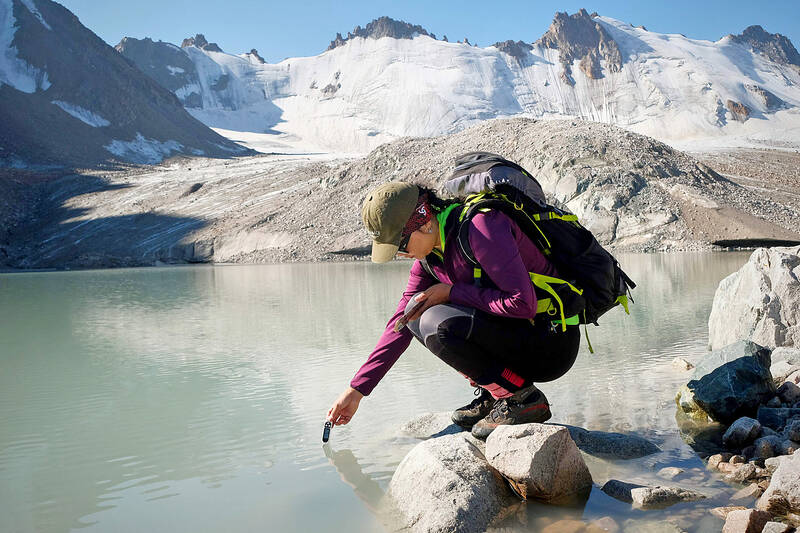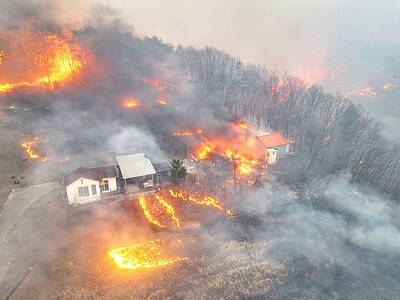Near a wooden hut high up in the Kyrgyz mountains, scientist Gulbara Omorova walked to a pile of gray rocks, reminiscing how the same spot was a glacier just a few years ago.
At an altitude of 4,000m, the 35-year-old researcher is surrounded by the giant peaks of the towering Tian Shan range that also stretches into China, Kazakhstan and Uzbekistan.
The area is home to thousands of glaciers that are melting at an alarming rate in Central Asia, already hard-hit by climate change. A glaciologist, Omarova is recording that process — worried about the future.

Photo: AFP
She hiked six hours to get to the modest triangular-shaped hut that serves as a science station — almost up in the clouds.
“Eight to 10 years ago you could see the glacier with snow,” she said.
“But in the last three to four years, it has disappeared completely. There is no snow, no glacier,” she said.
The effects of a warming planet have been particularly visible in Central Asia, which has seen a wave of extreme weather disasters.
The melting of thousands of glaciers is a major threat to people in the landlocked region that already suffers from a shortage of water. Acting as water towers, glaciers are crucial to the region’s food security and vital freshwater reserves are now dwindling fast.
Equipped with a measuring device, Omorova kneeled over a torrent of melted water, standing on gray-covered ice shimmering in strong sunshine.
“We are measuring everything,” she said. “The glaciers cannot regenerate because of rising temperatures.”
A little further on, she points to the shrinking Adygene glacier, saying it has retreated by around 16cm every year.
“That’s more than 900 metres since the 1960s,” she said.
The once majestic glacier is only one of thousands in the area that are slowly disappearing.
Between 14 and 30 percent of glaciers in the Tian-Shan and Pamir — the two main mountain ranges in Central Asia — have melted over the last 60 years, a report by the Eurasian Development Bank.
Omorova warned that things are only becoming worse.
“The melting is much more intense than in previous years,” she said.
With scientists warning that 2024 is likely to be the hottest year on record, professions like hers have hugely grown in importance.
However, resources are scarce in Kyrgyzstan — one of the poorest countries in former Soviet Central Asia.
“We lack measuring equipment and there is not enough money to transport things to our observation station, where we don’t even have electricity,” Omorova said.
She hopes the Kyrygz government will draw up a law to protect the ice-covered giants.
The shrinking glaciers have also created a new threat for Kyrgyz towns and cities, with meltwater forming new lakes before tumbling down mountains in dangerous torrents, including toward the capital, Bishkek.
Further down the valley — in a grass-covered part of the mountain at 2,200m — two scientists, brothers Sergei and Pavel Yerokhin, worked on the banks of the fast-flowing water.
The elder brother, 72-year-old Sergei, warned of the dangers of the torrents.
“This water mass takes rocks with it, flows down the valley and can reach towns,” he said.
Their task is to monitor and predict the water flow and to “draw up maps to ensure people and infrastructure don’t end up in these dangerous areas,” he said.
His brother Pavel had a sensor installed about 50cm above the water that would send radio signals in case of flooding.
For the Kyrgyz government, the melting glaciers threaten more than infrastructure damage. Water distribution in the region — devised in the Soviet era — remains a thorny issue and is a frequent source of tension between neighbors. Mountainous Kyrgyzstan and Tajikistan — home to about 10,000 glaciers each, according to Omorova — are the main water providers for Central Asia.
“We share water with our neighbors downstream,” Omorova said, referring to Kazakhstan, Uzbekistan and Turkmenistan, home to most of Central Asia’s population.
Aside from rising temperatures, the glaciers also face another threat: a growing appetite for immense natural resources in the region, including for gold, whose extraction with chemicals accelerates the melting of ice. Kyrgyzstan and Tajikistan have stepped up efforts to draw attention to a looming catastrophe.
Kyrgyz President Sadyr Japarov last year warned that forecasts show Central Asian glaciers “will halve by 2050 and disappear completely by 2100.”

DEATH CONSTANTLY LOOMING: Decades of detention took a major toll on Iwao Hakamada’s mental health, his lawyers describing him as ‘living in a world of fantasy’ A Japanese man wrongly convicted of murder who was the world’s longest-serving death row inmate has been awarded US$1.44 million in compensation, an official said yesterday. The payout represents ¥12,500 (US$83) for each day of the more than four decades that Iwao Hakamada spent in detention, most of it on death row when each day could have been his last. It is a record for compensation of this kind, Japanese media said. The former boxer, now 89, was exonerated last year of a 1966 quadruple murder after a tireless campaign by his sister and others. The case sparked scrutiny of the justice system in

The head of Shin Bet, Israel’s domestic intelligence agency, was sacked yesterday, days after Israeli Prime Minister Benjamin Netanyahu said he no longer trusts him, and fallout from a report on the Oct. 7, 2023, Hamas attack. “The Government unanimously approved Prime Minister Benjamin Netanyahu’s proposal to end ISA Director Ronen Bar’s term of office,” a statement said. He is to leave his post when his successor is appointed by April 10 at the latest, the statement said. Netanyahu on Sunday cited an “ongoing lack of trust” as the reason for moving to dismiss Bar, who joined the agency in 1993. Bar, meant to

DITCH TACTICS: Kenyan officers were on their way to rescue Haitian police stuck in a ditch suspected to have been deliberately dug by Haitian gang members A Kenyan policeman deployed in Haiti has gone missing after violent gangs attacked a group of officers on a rescue mission, a UN-backed multinational security mission said in a statement yesterday. The Kenyan officers on Tuesday were on their way to rescue Haitian police stuck in a ditch “suspected to have been deliberately dug by gangs,” the statement said, adding that “specialized teams have been deployed” to search for the missing officer. Local media outlets in Haiti reported that the officer had been killed and videos of a lifeless man clothed in Kenyan uniform were shared on social media. Gang violence has left

‘HUMAN NEGLIGENCE’: The fire is believed to have been caused by someone who was visiting an ancestral grave and accidentally started the blaze, the acting president said Deadly wildfires in South Korea worsened overnight, officials said yesterday, as dry, windy weather hampered efforts to contain one of the nation’s worst-ever fire outbreaks. More than a dozen different blazes broke out over the weekend, with Acting South Korean Interior and Safety Minister Ko Ki-dong reporting thousands of hectares burned and four people killed. “The wildfires have so far affected about 14,694 hectares, with damage continuing to grow,” Ko said. The extent of damage would make the fires collectively the third-largest in South Korea’s history. The largest was an April 2000 blaze that scorched 23,913 hectares across the east coast. More than 3,000